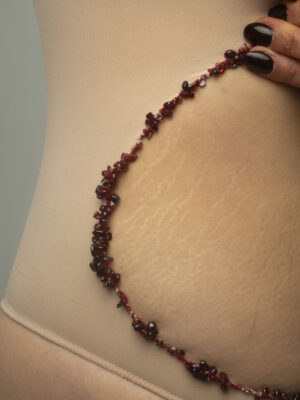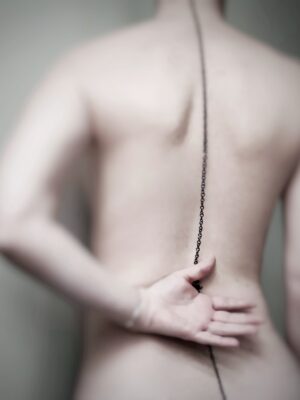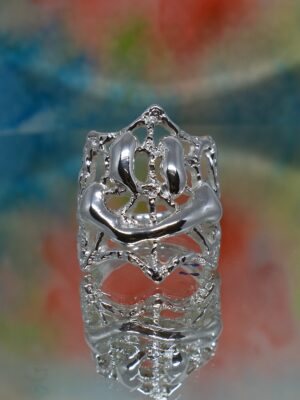
Japan is no exception to many new movements going on in the world of jewellery today.
Take a look at the new galleries specializing in art jewellery along with the emerging network of brands and it’s clear that art jewellery is finally starting to gain recognition in Japan.
Hiroki Masuzaki was the first part of this new movement to catch my eye. Up until now, people aspiring to play an active role in the international scene usually established their base overseas, or displayed their works at international exhibitions while staying in Japan.
Hiroki chose a path less familiar.
In his search for a uniquely Japanese form of expression taken from a fresh perspective, he decided to establish his own show room in Japan, something that had never been attempted in the Japanese jewellery scene.
He enrolled in the Art Jewellery Course at Hiko Mizuno College of Jewellery with aspirations to study abroad. His efforts paid off for the first time in 2004 when he was selected as a participant in Three Schools Project. This prestigious exhibition is held irregularly every few years and features selected student works from three rotating international art colleges—in this case, the Sandberg Institute in the Netherlands, the Academy of Fine Arts in Munich, and the Hiko Muzuno College of Jewellery in Japan.
Hiroki toured three countries, learning by experimenting with new ways of presenting his works as he gained new international friends. On the other hand, it also taught him the negative aspects of the jewellery scene in European countries.
In 2009 he was accepted into Gerrit Rietveld Academie in the Netherlands, though by that time his motivation had plummeted. He felt that “the scene in Europe no longer had a promising outlook. I knew that I had to visit firsthand specifically to find what kept the artisans motivated, how they continued to create amidst the naysaying.”
Arriving in the Netherlands, he found that the artists had similar questions and fears about the jewellery scene. They couldn’t take a step back to judge it objectively, must less step out of it.
Just a short month after enrolling, Hiroki went back to Japan.
Here he shifted his attention to the art jewellery scene in Japan that he had ignored for so long, only to find that there was no clearly defined scene or proper history. This brought him to think that, if European artists were stuck in an established art jewellery scene, then Japan could be a place for pioneers.
In doing so, he could not ignore how commercial jewellery permeates the public sphere in Japan.
For him, commercial jewellery entails meaningless jewellery that resorts to commercialism—rings sold with candy to children, fancy silver jewellery for young boys, accessories made of gold, silver, and other materials for young girls. Jewellery is available for every age group and for both sexes—a Japan-only phenomenon according to Hiroki. And nobody, at least in the field of art jewellery, has ever tried to work with commercial jewellery. This helped him think of a new method, where working on both commercial and artistic jewellery might allow him to reveal the reason why contemporary jewellery has failed to secure a foothold in Japan. Presenting this truth could be his way to suggest a new paradigm for jewellery.
Where others would use commercial jewellery as an inspiration for art, Hiroki is unique in the strategic way he clearly differentiates between commercial jewellery and art jewellery, while at the same time considering both as equivalent medias for his artistic expression.
Hiroki chose silver jewellery for his commercial jewellery line in launching the brand GIFTED with Masao Takahashi, a friend and longtime associate from his student days. Pieces from GIFTED maintain the size and style of conventional silver jewellery and are designed for everyday use. While they look different than his previous artistic pieces, they still share a connection. For example, some feature past designs, while others are conceptual, such as the combination of silver and iron to call up images of life and death. The matte finish of these works create an aura of tranquility. Hiroki likens the GIFTED collection to a tabula rasa—a fitting description for jewellery that changes its appearance as it spends time with the wearer.


Their artistic line is much more conceptual. One item is a ring with a single word, “TODAY,” engraved on the surface. This piece was inspired by the March 11th 2011 Japan earthquake and nuclear accident that caused intense human and physical tragedy, along with intense shock and confusion across the nation. Having lived through the event, we, the people of Japan, must questions what ‘today’ means to us everyday when think of the present, the day of the earthquake, and the days after it. We can no longer live today feeling like we did before that day.


The inside of the ring contains engravings of the edition number, Hiroki Masuzaki’s, and the text “MADE IN JAPAN.” To Hiroki, the earthquake gave this phrase a new meaning. Just as the March 11th earthquake changed how Japan thinks of ‘today,’ it also drastically changed how to world thinks of Japan.
Hiroki has another project—one to establish a unique voice for Japan in the world of art jewellery. He thinks that the late Kazuhiro Ito’s work had the potential to realize this goal, but his sudden death cut this possibility short. As some readers may know, Ito was an artist and teacher who played an important role from the late 1970s to 1990s and impacted many artists, including Jun Konishi, but not enough to set a trend for later generations. Ito’s pieces are characterized by their strong modern art influence, especially Japanese modern art, which shows the inner power of its materials in a subdued manner. Hiroki, having studied under Ryuichiro Nakamura, one of Ito’s students, has positioned himself along Ito’s lineage.
This project aims to create comprehensive documents of Ito’s activities that currently exist only as fragments.




All of these activities are based in the city of Kokura, a five-hour bullet train ride from Tokyo. Hiroki had his reasons to move from Tokyo. It’s the hometown of his wife, Akiko, but more importantly, far removed from the Fukushima nuclear power plant, which experienced a partial meltdown after the cooling system failed due to the March 11th tsunami. Tokyo and Fukushima are about 200km apart, but who can say how far is safe enough when it comes to radioactive contamination? He chose to desert Tokyo with his wife, rather than risk the danger of growing complacent beneath the shadow of Fukushima.
Most recently, he opened the show room HOLIC last November, which exhibits jewellery by Japanese artists, including GIFTED, his personal brand.
HOLIC is located on a recessed street corner, so you can’t see inside unless you open the door. It’s cramped quarters can barely squeeze in three people. There is a workbench on the left and a glass case on the right. Customers chat with Hiroki over this counter.
Dialogue is his driving force.



He talks with customers to build solid relationships, the kind he couldn’t find in Tokyo. He hashes out ideas with Akiko to develop concepts or find viewpoints within himself that he would never have thought of otherwise. He listens to the stories of artists he is dealing with to understand their ideas and personalities.
All these conversation will fuel his future projects.
Hiroki’s next step is to expand his activities to the international scene. Have a chat with him—be part of this new movement.

Translation assistance and editing by David Kracker
HOLIC | JEWELLRY & REFABRIC THINGS
103 SENBA ESTATE BLDG.7-14 Senbamachi Kokurakita-ku Kitakyushu Fukuoka 802-0007 JAPAN
www.gallery-holic.com
info@gallery-holic.com


